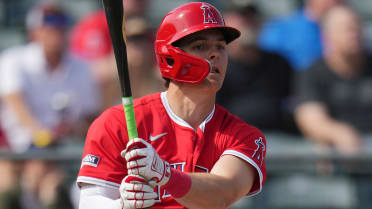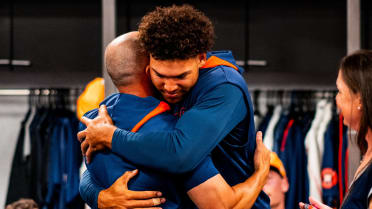This fact might not surprise you -- considering that batting averages are down, strikeouts are up, defensive shifts are stealing hits and all of those other things baseball people talk about -- but here goes: There has not been a 20-game hitting streak all season. The longest hitting streak of 2018 has been Michael Brantley's 19-gamer from May 9-30.
The last time nobody in baseball put together a 20-game hitting streak was in 1972.
Hitting streaks have always been capricious and odd things. There have been 21 30-game hitting streaks over the past 40 seasons, some by stars (Paul Molitor, George Brett, Freddie Freeman, Jose Pujols, Vladimir Guerrero), some by surprising characters (Dan Uggla, Jerome Walton, Willy Taveras) and none by the players you would most expect (Wade Boggs, Tony Gwynn, Rod Carew, Ichiro Suzuki, Jose Altuve, etc).
Thirty-game hitting streaks have become the standard. We've gotten to a point in baseball history where even talking about the most famous streak of them all -- Joe DiMaggio's 56-gamer in 1941 -- is like talking about unicorns and dragons. Nobody has ever come within 10 games of the Yankee Clipper's streak, and only one person this century (Jimmy Rollins in 2005) has come within 20 games.
So for Throwback Thursday, let's take wayback machine 40, to the day when Pete Rose dared threaten DiMaggio's streak.
On July 31, 1978 vs. the Braves, Rose faced knuckleballing Hall of Famer Phil Niekro in the sixth inning. Rose at the time was on a remarkable 43-game hitting streak. And that streak was remarkable in every sense of that word.
Rose was 37 years old and supposedly near the end of his career. He got his 3,000th hit in early May, sparking countless "Rose is going to the Hall of Fame" love letters from writers. He promptly went into a massive slump. The papers pointed out that going into June 14, he was in a 6-for-44 slump and was only hitting .229 against lefties all year. Rose griped that he was hitting the ball well enough, but he was hitting them right at fielders.
"I can talk all I want about line drives," he muttered. "They catch 'em, and that's baseball."
Rose began his streak on June 14 when he spanked a couple of singles against the Cubs, but it wasn't like some light just turned on. On June 22 -- Game 7 of the streak -- he waited until his last at-bat before knocking a single off San Francisco's Charlie Williams.
The first newspaper notice for the streak came when it reached 10 games. Rose led off against the Dodgers with a single. After the game, though, he only wanted to talk about being asked to sacrifice bunt late in the game.
"I'm finally swinging the bat good," he said, "and I gotta be a sacrifice bunter? … Anyway, I got it down. See, there's guys with 3,000 hits who can bunt."
The streak coughed along. What was striking was that Rose wasn't hitting thati well. He got just five hits in the five games between June 26-30. But he spread them out so he got one every day. He led off with a single on July 4 to push his streak to 20 games. It was the fifth 20-game hitting streak of Rose's career.
Rose and Ty Cobb recorded hitting streaks of at least 20 games or more eight times, which is the most in the modern era (since 1900). This is including streaks overlapping multiple seasons, since those are counted in the official records.
Heading into the All-Star break, Rose had pushed the streak to 25 game, and for the first time the name "DiMaggio" was brought up. Rose did not balk at the challenge.
"I might go on forever," Rose said.
Rose tied the Vada Pinson's Cincinnati record on July 14 with a single off Mets right-hander Pat Zachry, then broke it the next day when he led off with a single against Craig Swan. Rose was up to 28 games, halfway to DiMaggio, and he made it clear that his goals were much bigger than the team record.
"It has no real meaning," Rose said, "because the Major League record is so far off."
In Game 29, he was 0-for-4 against the Mets when he managed to crack a double off the wall against lefty Paul Siebert. That day someone quoted DiMaggio saying, "Someday, someone will break it, and if that's the case, I hope it's Pete Rose."
"That's pretty great," Rose said. "I hope it's Pete Rose, too."
When Rose got to 30 games, The Cincinnati Enquirer began a daily graphic called "The Pete Rose Hit Parade."
Game 32 of the streak was contentious; Rose was hitless against the Phillies when he drew a controversial walk in the eighth inning. The Phillies thought he swung, and the argument led to ejections. Even so, Rose thought the streak was over.
But George Foster hit a grand slam and the Reds batted around in the eighth. Rose got one more chance with two outs in the ninth inning of a 7-2 game. He laid a bunt down the third-base line; Mike Schmidt was playing deep and was caught napping.
"I know they might be mad about me bunting with with a five-run lead," Rose said. "But it's taken me 16 years to get to 31 in a row, and if they give me a bunt, I'll take it."
The next record to shoot for was Tommy Holmes' modern (post-1900) National League record 37-game hitting streak, and Rose plodded toward it. For Game 33, he beat out an infield single. In Game 34, he grounded a ball up the middle into center field. In Game 35, he blooped a single over a drawn in infield. And in Game 36, putting him one shy of the record, he lined a single off Montreal's Steve Rogers, the same pitcher who gave up Rose's 3,000th hit.
"I know he remembers me," Rose said.
The pressure was now building. Rose was on the front page of every sports section. He said that people were calling his hotel in the middle of the night asking for interviews. Reporters and autograph hounds were everywhere. Rose was defiant.
"Ain't no pressure," he said as he went into Game 37 in New York. "I've hit in 36 straight. No reason I can't hit in another."
He clocked Game 37 in the seventh inning with a line-drive single to left. The next day, in front of more than 38,000 -- the largest Tuesday crowd at Shea Stadium in years -- Rose broke the NL modern record in style, getting three hits while Mets fans wore T-shirts saying, "I saw Pete Rose do it."
"They're getting $4.50 for those shirts," Reds manager Sparky Anderson said in wonder. "And they're selling Mets banners for a buck and a half."
Rose faced an odd shift in Game 39 -- Mets' manager Joe Torre basically had his shortstop and third baseman standing right right next to each other in an effort to force Rose to pull the ball against right-hander Nino Espinosa. Rose pulled a double to right field in the fifth to keep the streak going.
At this point, Rose -- being an obsessive fan of baseball history and numbers -- began plotting his path through baseball history. He wanted to pass Ty Cobb, who had a 40-game streak. He then wanted to get past George Sisler, who hit in 41 straight. At that point, Rose would take on Wee Willie Keeler, who got to 44 straight in 1896. And after that, DiMaggio.
"When I get up around 45 or so," he told reporters, "you might start talking about DiMaggio. But Cobb is next."
Cobb's streak went down in the second game of a doubleheader against Philadelphia. Facing Steve Carlton, Rose once again challenged the alertness of Schmidt by laying down a bunt down the third-base line. Schmidt was ready this time, but the bunt was too good. The single gave him a 41-game streak.
"I've had chances to stop the streak, and I've failed both times," Schmidt said.
The next day, Rose passed Sisler with three hits. Rose got two more hits in Game 43, and now we are where we began this story, with Niekro on the mound and Rose trying to tie Keeler's all-time NL single-season record of 44.
Rose hated facing Niekro's knuckler. The man who loved nothing more than hitting basesballs said, "Trying to hit that pitch is a miserable living."
As it turns out, he didn't have to hit it. With a 2-0 count, Niekro threw a fastball, and Rose grounded it past a diving second baseman into right field for a single that gave him a 44-game hitting streak, tying him with Keeler. Fireworks went off at Fulton County Stadium; more than 45,000 fans stood and cheered
"It was actually a sinker, but it didn't sink," Niekro said. "It was strange. I felt like a villain in our own home ballpark."
Now, all that was left was DiMaggio.
Here are a couple of odd things about Pete Rose's 44-game hitting streak. One, he did not hit a home run during the streak. Home runs can be pretty important parts of a hitting streak, because they are the surest sorts of hits; DiMaggio had 15 of them in his 56-game streak. But Rose went through the defense for every one of his hits. Two, it ended with controversy -- at least in Rose's mind.
On Aug. 1, 40 years ago yesterday, the Reds played in Atlanta again, and more than 30,000 people were there. It wasn't Rose's night. In the second, he lined a ball up the middle, a sure single that pitcher Larry McWilliams somehow snagged before it could sail into center field. It was such a staggering play, that Rose actually stopped running and applauded McWilliams.
"I don't know how he caught it, I really don't," Rose said. "The ball was behind him. Two inches either way, it's a base hit."
In the seventh, Rose smashed a line drive that again seemed like a sure hit -- so sure that Dave Collins, who was on first at the time, took off on the hopes of getting to third. But Braves third baseman Bob Horner reeled it in and threw to first to double off Collins.
"If he hadn't caught that ball," Rose said, "they'd have had to take him to the hospital to dig it out."
Finally, there were two outs in the ninth, the Braves led, 16-4, and Rose came up for the final time. He faced side-winding reliever Gene Garber. And Garber was deadly serious about getting Rose out.
"I was a little surprised," Rose said, "that in a game that was 16-4, he pitched me like it was the seventh game of the World Series. I guess he thought it was Joe DiMaggio up there."
It was funny to hear Rose say that, because with his team down, 16-4, he attempted to bunt for a hit. He pushed it foul. After a couple of balls, Garber got Rose to foul one back. There was a 2-2 count, and the Atlanta crowd was chanting "Pete Rose! Pete Rose!" Rose fully expected Garber to challenge him with a fastball.
Garber instead threw his changeup, and it broke out of the zone. Rose swung anyway and missed to end the game and the streak. Garber leaped up in celebration. Rose was furious.
"It's easy to make pitches like that when you're up, 16-4," Rose moaned. "I just hope to get to see him tomorrow in a one-run game and hit a rope up the middle, and I mean hard."
Garber was baffled by Rose's complaint.
"That's the way I have to pitch to feed my family," he said. "Sure, I'm sorry the streak is over. But I couldn't sleep if I ever say that somebody got a hit off of me when I gave it less than my best."
Rose never forgave Garber for throwing him a changeup in that moment. More than 30 years later, Rose was still furious that he didn't get what he called "an honest shot to catch DiMaggio." It made for good talk radio fodder, anyway. Rose never had another hitting streak like it, but as he said. those kinds of streaks come once in a lifetime -- if you are lucky.
"It has been really good for baseball," he said in the end. And then he shrugged. "Now they'll have about 10,000 fans in the Atlanta stands tomorrow."
Joe Posnanski is a columnist for MLB.com.



